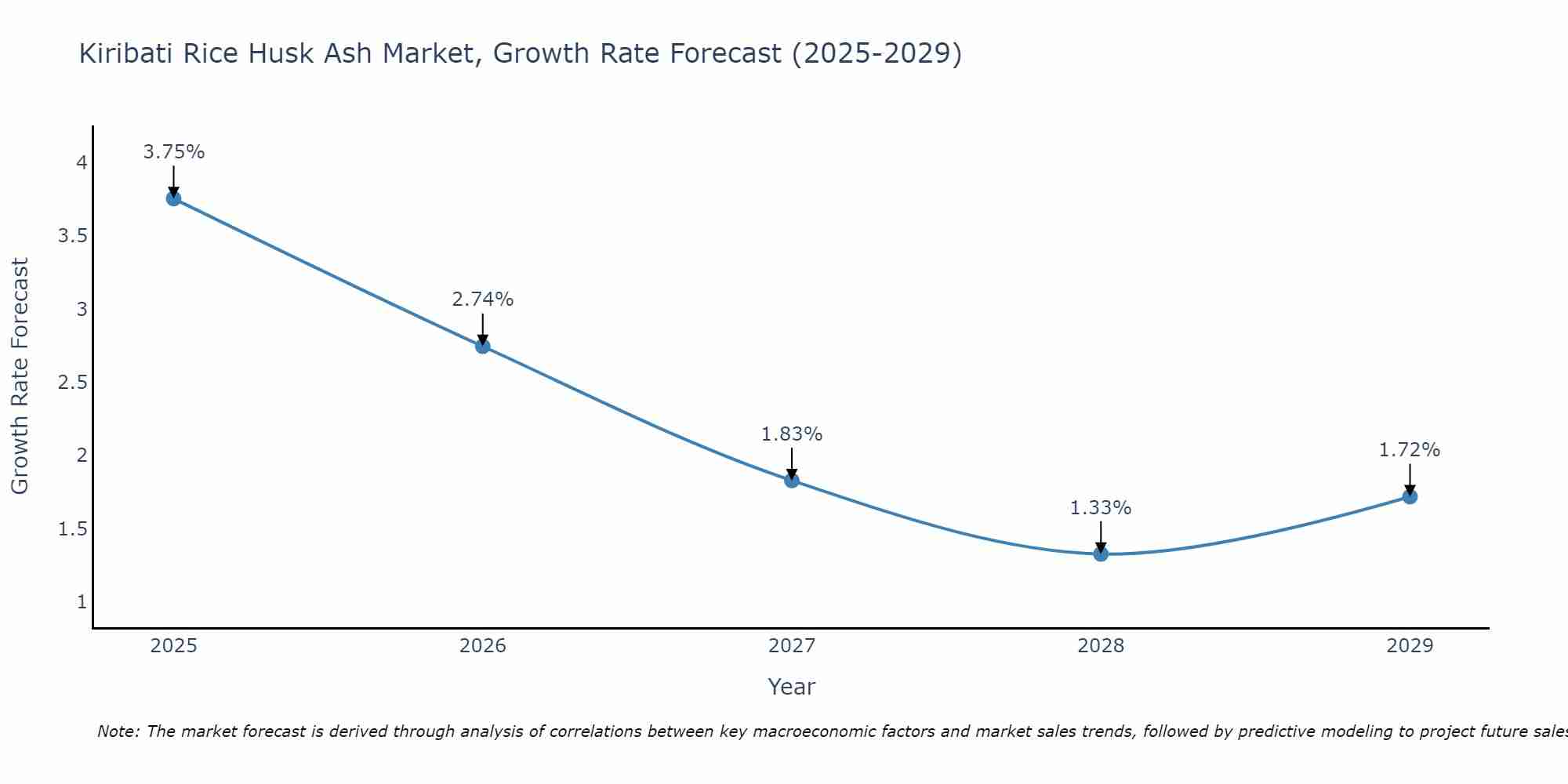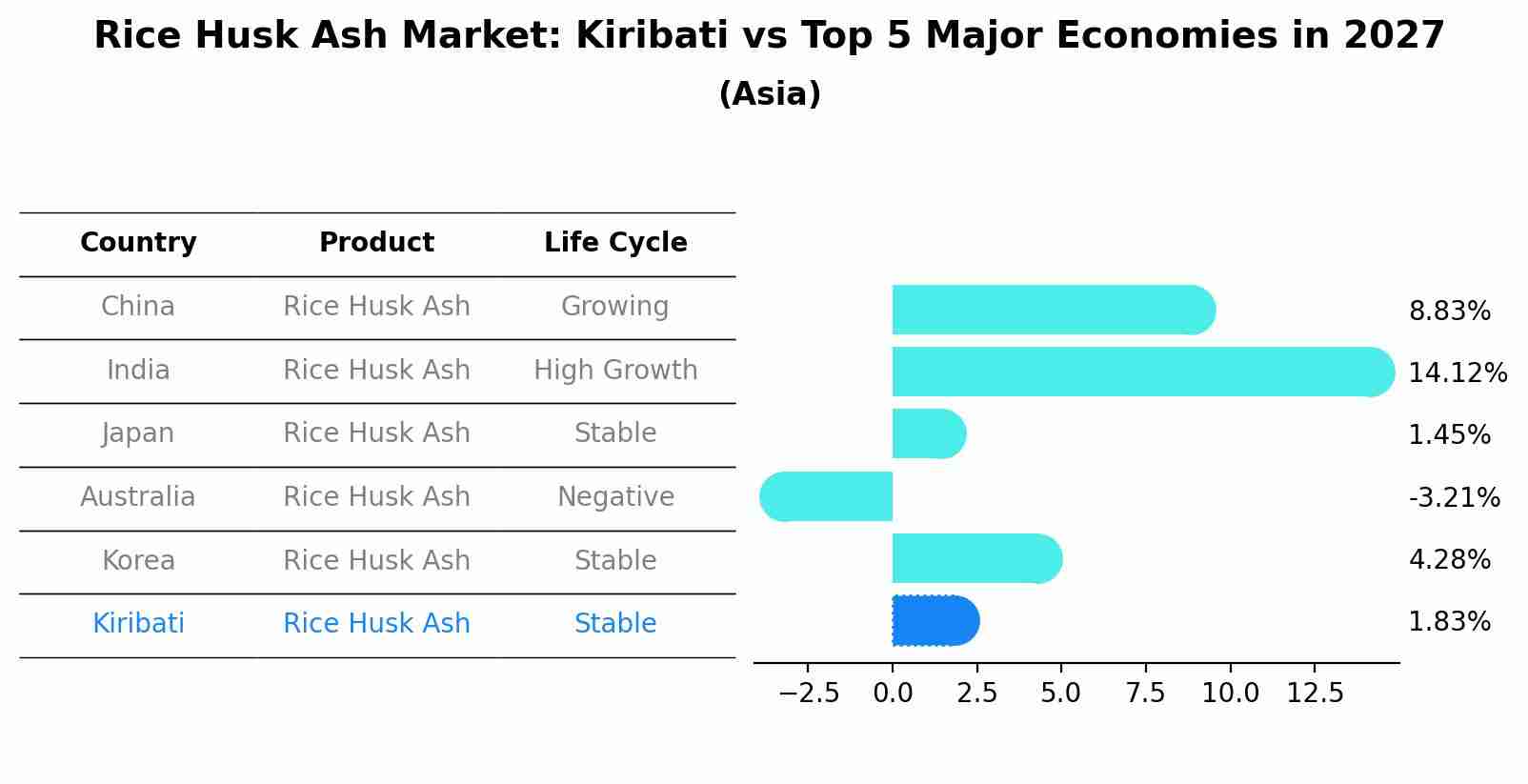Kiribati Rice Husk Ash Market (2025-2031) | Companies, Analysis, Size, Growth, Outlook, Value, Segmentation, Trends, Industry, Revenue, Share & Forecast
| Product Code: ETC4843778 | Publication Date: Nov 2023 | Updated Date: Apr 2025 | Product Type: Market Research Report | |
| Publisher: 6Wresearch | Author: Shubham Padhi | No. of Pages: 60 | No. of Figures: 30 | No. of Tables: 5 |
Kiribati Rice Husk Ash Market Size Growth Rate
The Kiribati Rice Husk Ash Market is projected to witness mixed growth rate patterns during 2025 to 2029. Starting high at 3.75% in 2025, the market steadily declines to 1.72% by 2029.

Rice Husk Ash Market: Kiribati vs Top 5 Major Economies in 2027 (Asia)
The Rice Husk Ash market in Kiribati is projected to grow at a stable growth rate of 1.83% by 2027, highlighting the country's increasing focus on advanced technologies within the Asia region, where China holds the dominant position, followed closely by India, Japan, Australia and South Korea, shaping overall regional demand.

Key Highlights of the Report:
- Kiribati Rice Husk Ash Market Outlook
- Market Size of Kiribati Rice Husk Ash Market, 2024
- Forecast of Kiribati Rice Husk Ash Market, 2031
- Historical Data and Forecast of Kiribati Rice Husk Ash Revenues & Volume for the Period 2021-2031
- Kiribati Rice Husk Ash Market Trend Evolution
- Kiribati Rice Husk Ash Market Drivers and Challenges
- Kiribati Rice Husk Ash Price Trends
- Kiribati Rice Husk Ash Porter`s Five Forces
- Kiribati Rice Husk Ash Industry Life Cycle
- Historical Data and Forecast of Kiribati Rice Husk Ash Market Revenues & Volume By Silica Content for the Period 2021-2031
- Historical Data and Forecast of Kiribati Rice Husk Ash Market Revenues & Volume By 80-84% for the Period 2021-2031
- Historical Data and Forecast of Kiribati Rice Husk Ash Market Revenues & Volume By 85-89% for the Period 2021-2031
- Historical Data and Forecast of Kiribati Rice Husk Ash Market Revenues & Volume By 90-94% for the Period 2021-2031
- Historical Data and Forecast of Kiribati Rice Husk Ash Market Revenues & Volume By Greater Than 95% for the Period 2021-2031
- Historical Data and Forecast of Kiribati Rice Husk Ash Market Revenues & Volume By Silica Extraction Process for the Period 2021-2031
- Historical Data and Forecast of Kiribati Rice Husk Ash Market Revenues & Volume By Alkaline Extraction for the Period 2021-2031
- Historical Data and Forecast of Kiribati Rice Husk Ash Market Revenues & Volume By Precipitated Silica Extraction for the Period 2021-2031
- Historical Data and Forecast of Kiribati Rice Husk Ash Market Revenues & Volume By Mesoporous Silica Extraction for the Period 2021-2031
- Historical Data and Forecast of Kiribati Rice Husk Ash Market Revenues & Volume By Sol-Gel Method for the Period 2021-2031
- Historical Data and Forecast of Kiribati Rice Husk Ash Market Revenues & Volume By Application for the Period 2021-2031
- Historical Data and Forecast of Kiribati Rice Husk Ash Market Revenues & Volume By Building and Construction for the Period 2021-2031
- Historical Data and Forecast of Kiribati Rice Husk Ash Market Revenues & Volume By Steel Industry for the Period 2021-2031
- Historical Data and Forecast of Kiribati Rice Husk Ash Market Revenues & Volume By Ceramics and Refractory for the Period 2021-2031
- Historical Data and Forecast of Kiribati Rice Husk Ash Market Revenues & Volume By Rubber for the Period 2021-2031
- Historical Data and Forecast of Kiribati Rice Husk Ash Market Revenues & Volume By Others for the Period 2021-2031
- Kiribati Rice Husk Ash Import Export Trade Statistics
- Market Opportunity Assessment By Silica Content
- Market Opportunity Assessment By Silica Extraction Process
- Market Opportunity Assessment By Application
- Kiribati Rice Husk Ash Top Companies Market Share
- Kiribati Rice Husk Ash Competitive Benchmarking By Technical and Operational Parameters
- Kiribati Rice Husk Ash Company Profiles
- Kiribati Rice Husk Ash Key Strategic Recommendations
Frequently Asked Questions About the Market Study (FAQs):
1 Executive Summary |
2 Introduction |
2.1 Key Highlights of the Report |
2.2 Report Description |
2.3 Market Scope & Segmentation |
2.4 Research Methodology |
2.5 Assumptions |
3 Kiribati Rice Husk Ash Market Overview |
3.1 Kiribati Country Macro Economic Indicators |
3.2 Kiribati Rice Husk Ash Market Revenues & Volume, 2021 & 2031F |
3.3 Kiribati Rice Husk Ash Market - Industry Life Cycle |
3.4 Kiribati Rice Husk Ash Market - Porter's Five Forces |
3.5 Kiribati Rice Husk Ash Market Revenues & Volume Share, By Silica Content, 2021 & 2031F |
3.6 Kiribati Rice Husk Ash Market Revenues & Volume Share, By Silica Extraction Process, 2021 & 2031F |
3.7 Kiribati Rice Husk Ash Market Revenues & Volume Share, By Application, 2021 & 2031F |
4 Kiribati Rice Husk Ash Market Dynamics |
4.1 Impact Analysis |
4.2 Market Drivers |
4.3 Market Restraints |
5 Kiribati Rice Husk Ash Market Trends |
6 Kiribati Rice Husk Ash Market Segmentations |
6.1 Kiribati Rice Husk Ash Market, By Silica Content |
6.1.1 Overview and Analysis |
6.1.2 Kiribati Rice Husk Ash Market Revenues & Volume, By 80-84%, 2021-2031F |
6.1.3 Kiribati Rice Husk Ash Market Revenues & Volume, By 85-89%, 2021-2031F |
6.1.4 Kiribati Rice Husk Ash Market Revenues & Volume, By 90-94%, 2021-2031F |
6.1.5 Kiribati Rice Husk Ash Market Revenues & Volume, By Greater Than 95%, 2021-2031F |
6.2 Kiribati Rice Husk Ash Market, By Silica Extraction Process |
6.2.1 Overview and Analysis |
6.2.2 Kiribati Rice Husk Ash Market Revenues & Volume, By Alkaline Extraction, 2021-2031F |
6.2.3 Kiribati Rice Husk Ash Market Revenues & Volume, By Precipitated Silica Extraction, 2021-2031F |
6.2.4 Kiribati Rice Husk Ash Market Revenues & Volume, By Mesoporous Silica Extraction, 2021-2031F |
6.2.5 Kiribati Rice Husk Ash Market Revenues & Volume, By Sol-Gel Method, 2021-2031F |
6.3 Kiribati Rice Husk Ash Market, By Application |
6.3.1 Overview and Analysis |
6.3.2 Kiribati Rice Husk Ash Market Revenues & Volume, By Building and Construction, 2021-2031F |
6.3.3 Kiribati Rice Husk Ash Market Revenues & Volume, By Steel Industry, 2021-2031F |
6.3.4 Kiribati Rice Husk Ash Market Revenues & Volume, By Ceramics and Refractory, 2021-2031F |
6.3.5 Kiribati Rice Husk Ash Market Revenues & Volume, By Rubber, 2021-2031F |
6.3.6 Kiribati Rice Husk Ash Market Revenues & Volume, By Others, 2021-2031F |
7 Kiribati Rice Husk Ash Market Import-Export Trade Statistics |
7.1 Kiribati Rice Husk Ash Market Export to Major Countries |
7.2 Kiribati Rice Husk Ash Market Imports from Major Countries |
8 Kiribati Rice Husk Ash Market Key Performance Indicators |
9 Kiribati Rice Husk Ash Market - Opportunity Assessment |
9.1 Kiribati Rice Husk Ash Market Opportunity Assessment, By Silica Content, 2021 & 2031F |
9.2 Kiribati Rice Husk Ash Market Opportunity Assessment, By Silica Extraction Process, 2021 & 2031F |
9.3 Kiribati Rice Husk Ash Market Opportunity Assessment, By Application, 2021 & 2031F |
10 Kiribati Rice Husk Ash Market - Competitive Landscape |
10.1 Kiribati Rice Husk Ash Market Revenue Share, By Companies, 2024 |
10.2 Kiribati Rice Husk Ash Market Competitive Benchmarking, By Operating and Technical Parameters |
11 Company Profiles |
12 Recommendations | 13 Disclaimer |
- Single User License$ 1,995
- Department License$ 2,400
- Site License$ 3,120
- Global License$ 3,795
Search
Thought Leadership and Analyst Meet
Our Clients
Related Reports
- Afghanistan Apparel Market (2026-2032) | Growth, Outlook, Industry, Segmentation, Forecast, Size, Companies, Trends, Value, Share, Analysis & Revenue
- Canada Oil and Gas Market (2026-2032) | Share, Segmentation, Value, Industry, Trends, Forecast, Analysis, Size & Revenue, Growth, Competitive Landscape, Outlook, Companies
- Germany Breakfast Food Market (2026-2032) | Industry, Share, Growth, Size, Companies, Value, Analysis, Revenue, Trends, Forecast & Outlook
- Australia Briquette Market (2025-2031) | Growth, Size, Revenue, Forecast, Analysis, Trends, Value, Share, Industry & Companies
- Vietnam System Integrator Market (2025-2031) | Size, Companies, Analysis, Industry, Value, Forecast, Growth, Trends, Revenue & Share
- ASEAN and Thailand Brain Health Supplements Market (2025-2031) | Strategy, Consumer Insights, Analysis, Investment Trends, Opportunities, Growth, Size, Share, Industry, Revenue, Segments, Value, Segmentation, Supply, Forecast, Restraints, Outlook, Competition, Drivers, Trends, Demand, Pricing Analysis, Competitive, Strategic Insights, Companies, Challenges
- ASEAN Bearings Market (2025-2031) | Strategy, Consumer Insights, Analysis, Investment Trends, Opportunities, Growth, Size, Share, Industry, Revenue, Segments, Value, Segmentation, Supply, Forecast, Restraints, Outlook, Competition, Drivers, Trends, Demand, Pricing Analysis, Competitive, Strategic Insights, Companies, Challenges
- Europe Flooring Market (2025-2031) | Outlook, Share, Industry, Trends, Forecast, Companies, Revenue, Size, Analysis, Growth & Value
- Saudi Arabia Manlift Market (2025-2031) | Outlook, Size, Growth, Trends, Companies, Industry, Revenue, Value, Share, Forecast & Analysis
- Uganda Excavator, Crane, and Wheel Loaders Market (2025-2031) | Strategy, Consumer Insights, Analysis, Investment Trends, Opportunities, Growth, Size, Share, Industry, Revenue, Segments, Value, Segmentation, Supply, Forecast, Restraints, Outlook, Competition, Drivers, Trends, Demand, Pricing Analysis, Competitive, Strategic Insights, Companies, Challenges
Industry Events and Analyst Meet
Whitepaper
- Middle East & Africa Commercial Security Market Click here to view more.
- Middle East & Africa Fire Safety Systems & Equipment Market Click here to view more.
- GCC Drone Market Click here to view more.
- Middle East Lighting Fixture Market Click here to view more.
- GCC Physical & Perimeter Security Market Click here to view more.
6WResearch In News
- Doha a strategic location for EV manufacturing hub: IPA Qatar
- Demand for luxury TVs surging in the GCC, says Samsung
- Empowering Growth: The Thriving Journey of Bangladesh’s Cable Industry
- Demand for luxury TVs surging in the GCC, says Samsung
- Video call with a traditional healer? Once unthinkable, it’s now common in South Africa
- Intelligent Buildings To Smooth GCC’s Path To Net Zero


















